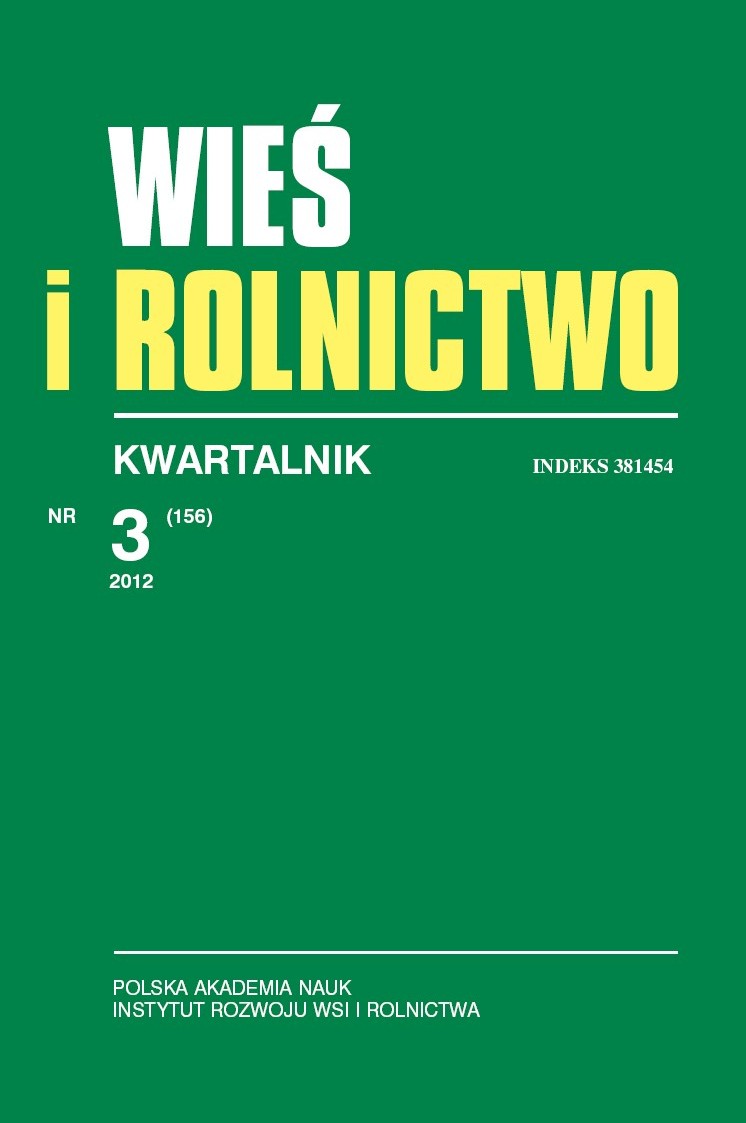The role of local elected officials in the making of LEADER local action groups in the Czech Republic
DOI:
https://doi.org/10.53098/wir.2012.3.156/03Keywords:
public action, local elected officials, political leadership, local development, Czech RepublicAbstract
Local elected officials in practice exercise political leadership by their involvement in partnerships and their status on the local co-operation scene. The implementation of the LEADER programme, in terms of project selection, reveals that this political leadership has taken over this model of local development, which it sees as an instrument for updating public amenities and services and a source of legitimacy for its action. The configuration of local action groups is examined via the membership of the partnerships and analysis of networks of stakeholders, on the basis of empirical research.References
Baldersheim H., Illner M., Wollmann H., 2003: Local Democracy in Post-Communist Europe. Urban Research International, Leske, Budrich, Opladen. DOI: https://doi.org/10.1007/978-3-663-10677-7
Dargan L., Shucksmith M., 2008: LEADER and innovation. ”Sociologia Ruralis” 48: 271–294. DOI: https://doi.org/10.1111/j.1467-9523.2008.00463.x
Denters B., Rose L.E., 2005: Comparing Local Governance. Trends and Developments. Palgrave Macmillan, Houndmills, Basingstoke, Hampshire. DOI: https://doi.org/10.1007/978-0-230-21242-8
Granovetter M. 1983: The Strength of Weak Ties: A Network Theory Revisited. ”Sociological Theory” 1: 201–233. DOI: https://doi.org/10.2307/202051
Halamska M., Maurel M.-C., 2010: Les acteurs locaux a l'épreuve du modele européen LEADER. France-Hongrie-Pologne. IRWiR PAN & CEFRES, Prague.
Highley J., Lengyel G., 2000: Elites after State Socialism. Theories and Analysis. Rowman & Littlefield Publishers, Lanham.
Keohane N.O., 2010: Thinking about leadership. Princeton University Press, Princeton. DOI: https://doi.org/10.1515/9781400836086
Kovach I., 2000: LEADER, a New Social Order and the Central-and East-European Countries. ”Sociologia Ruralis” 40, 2: 181–189. DOI: https://doi.org/10.1111/1467-9523.00140
Kovach I., Kueerova E., 2006: The Project Class in Central Europe: The Czech and Hungarian Cases. ”Sociologia Ruralis” 46, 1: 3–19. DOI: https://doi.org/10.1111/j.1467-9523.2006.00403.x
Lascoumes P., Le Gales P., 2007: Sociologie de l'action publique. Armand Colin, Paris.
Lin N., 1995: Les ressources sociales: une théorie du capital social. ”Revue française de sociologie” 36, 4: 685–704. DOI: https://doi.org/10.2307/3322451
Lin N., 2001: Social Capital: A Theory of Social Structure and Action. Cambridge University Press, Cambridge. DOI: https://doi.org/10.1017/CBO9780511815447
Lostak M., Hude_kova H., 2010: Preliminary impacts of the LEADER+ approach in the Czech Republic. ”Agricultural economics. – Czech” 56 (6): 249–265. DOI: https://doi.org/10.17221/27/2010-AGRICECON
Maurel M.-C., 2005: Temps de recomposition des territoires ruraux en Europe centrale. Retour sur une expérience de terrain. ”Revue d'études comparatives Est-Ouest” 36, 2: 5–38. DOI: https://doi.org/10.3406/receo.2005.1706
Maurel M.-C., 2008: L’action publique ”par le bas”: l’approche LEADER en Europe centrale. ”Revue d'études comparatives Est-Ouest” 4: 33–61. DOI: https://doi.org/10.4074/S0338059908004038
Maurel M.-C., 2008: Local Development Stakeholders and the European Model. Learning the LEADER Approach in the New Member States. ”Czech Sociological Review” 44, 3: 511–530. DOI: https://doi.org/10.13060/00380288.2008.44.3.04
Ray C., 2000: The EU LEADER Programme: Rural Development Laboratory. ”Sociologia Ruralis” 40, 2: 163–172. DOI: https://doi.org/10.1111/1467-9523.00138
Weber M., 1947: The Theory of Social and Economics Organization. Oxford University Press, Oxford.
Downloads
Article file downloads
Pages
How to Cite
Issue
Section
License
Copyright (c) 2012 Wieś i Rolnictwo

This work is licensed under a Creative Commons Attribution 4.0 International License.










